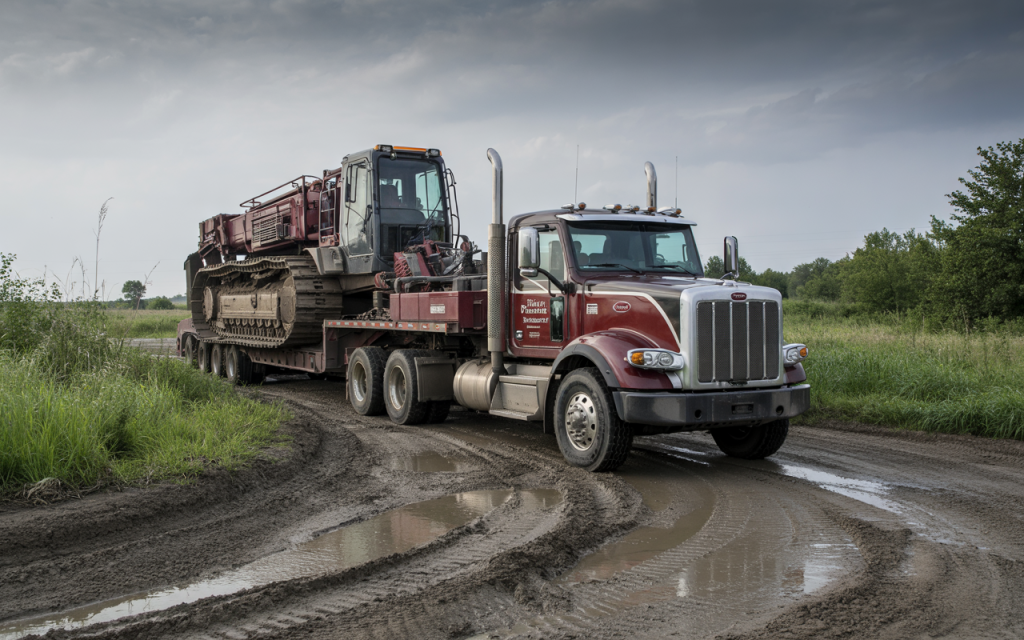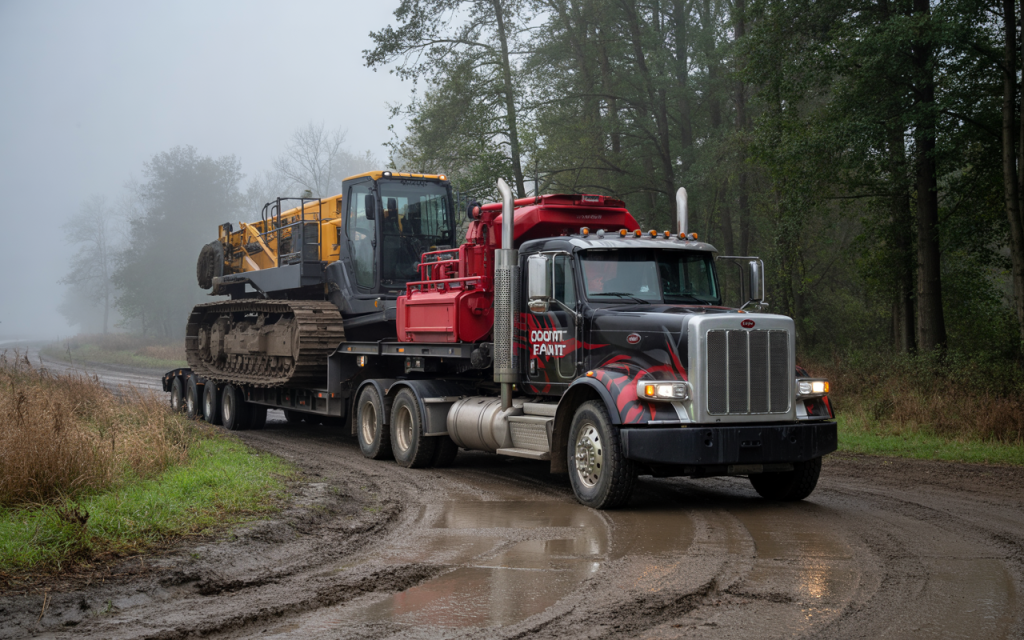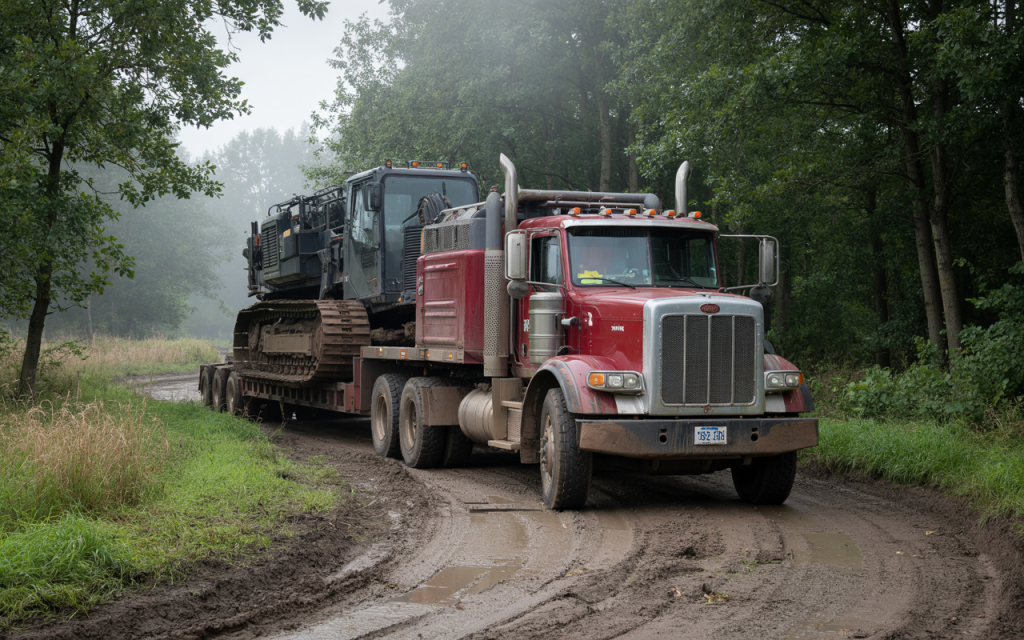How We Plan Heavy Haul Routes in Kentucky
Freedom Heavy Haul can offer expedited Pickup and Delivery for any size shipment anywhere in the USA. Contact us today for No Hassle, No Pressure Pricing.
To move oversized or overweight cargo through Kentucky legally and safely, we carefully plan routes based on permits, bridge weight limits, road conditions, and coordination with state and local agencies. This planning process helps us avoid delays, fines, and cargo damage while keeping your freight on schedule.
In this article, you will learn How We Plan Heavy Haul Routes in Kentucky.
What Heavy Haul Trucking Means in Kentucky
Heavy haul trucking involves transporting cargo that exceeds Kentucky’s legal size or weight limits. These loads require more than just a truck—they need special permits, escorts, and a custom route that can handle the load’s dimensions.

When a Load Qualifies as Heavy Haul
A load becomes a heavy haul when it exceeds any of these legal limits:
- Width: 8 feet 6 inches
- Height: 13 feet 6 inches
- Length: 65 feet (for tractor-trailers)
- Gross Weight: 80,000 pounds
Examples of heavy haul freight include industrial machinery, wind turbine blades, transformers, and structural steel.
Our Approach to Permits and Regulations
Before we begin any move, we determine what type of permit is required and apply through the Kentucky Transportation Cabinet (KYTC).
Types of Heavy Haul Permits We Handle
- Single-trip permits for one-time shipments
- Annual permits for recurring or similar-sized loads
- Superload permits for extremely large or heavy cargo
What We Include in a Permit Application
- Description of the cargo
- Axle weights and vehicle specs
- Starting and ending points
- Preferred route
The goal is to ensure your load moves through Kentucky safely and in compliance with all regulations.
How We Evaluate the Route
Route selection is not just about getting from Point A to Point B. It’s about identifying a path that supports your cargo’s size and weight without risk.
Key Route Considerations
- Bridge weight limits
- Road surface durability
- Overhead and roadside clearance
- Curves, grades, and turning radii
We use tools like Kentucky’s GIS mapping system and AutoTURN to analyze the best possible path.
Infrastructure Checks and Road Readiness
Kentucky’s infrastructure must be ready to handle the stress of your load. We don’t take chances.
Verifying Bridge and Road Conditions
We work with state engineers to inspect bridges and roads along the planned route. If structural concerns arise, we adjust the path and resubmit the plan. This ensures your freight stays protected, and we avoid shutdowns or detours.
Coordinating With Agencies and Stakeholders
Permits and route approval often involve more than one authority. We take care of the coordination.

Who We Work With
- Kentucky Transportation Cabinet
- Kentucky State Police (for escorts)
- Local governments and municipalities
- Utility companies (to move power lines)
- Emergency services, if needed
By managing these relationships, we ensure approvals are secured efficiently and your schedule remains on track.
Using Technology to Improve Planning
We rely on technology to make routing faster, more accurate, and safer.

Digital Tools We Use
- Kentucky’s GIS routing systems
- AutoTURN for turn feasibility
- GPS tracking for real-time monitoring
- Bridge clearance and weight databases
- Traffic and weather alert integrations
With these tools, we can quickly adjust plans in response to road closures, weather, or permit changes.
Accounting for Kentucky’s Terrain and Climate
Seasons matter when moving heavy freight. We plan with Kentucky’s environment in mind.
Environmental Challenges We Consider
- Spring thaw can weaken rural roads
- Winter snow and ice reduce traction and clearance
- Flooding in low-lying areas like river valleys
- Narrow, winding roads in mountain regions
We schedule hauls based on these factors to avoid weather-related damage or road shutdowns.
Real Examples From Our Heavy Haul Projects
Understanding how we’ve handled real loads can help you see what to expect.
Case Study: Transformer to Pike County
We moved a 250,000-pound transformer from Louisville to Pike County. It required:
- A superload permit
- Multiple bridge inspections
- Utility crews to raise power lines
- Police escorts in tight urban zones
Case Study: Wind Turbine Blade Across Rural Kentucky
A wind turbine blade crossed western Kentucky on narrow highways. The move required:
- Overnight travel approval
- Rural coordination with farmers
- Escort support from local police
These examples show how we manage every detail to protect your cargo.
Managing All the Moving Parts Together
Every aspect of the process—permits, route conditions, weather, timing, escorts—is connected. One delay can affect the whole operation.
How We Keep Everything Aligned
- We start with a solid route plan based on current infrastructure data
- We align permit timing with cargo readiness and crew availability
- We remain flexible in case weather or road conditions change
- We communicate regularly with all stakeholders
The result is a transport plan built to keep your load safe and your operation efficient.
FAQs About How We Plan Heavy Haul Routes in Kentucky
Here are some questions and answers:
Do I always need a permit for heavy haul in Kentucky?
Yes. Any load that exceeds legal size or weight limits requires a special permit issued by the Kentucky Transportation Cabinet.
How long does it take to get a permit approved?
It typically takes 1–2 business days for regular permits. Superloads may take longer due to additional engineering reviews.
What happens if my route includes a weak bridge?
We either reroute or coordinate a structural analysis with state engineers. In some cases, bridge reinforcement or temporary restrictions are required.
Can you travel at night in Kentucky with a heavy load?
Not usually. Most heavy hauls must occur during daylight hours unless specific night travel is permitted.
How do I know if I need escort vehicles?
Escort requirements are based on your load’s dimensions and are outlined during the permit approval process. We handle escort coordination as part of your route planning.







